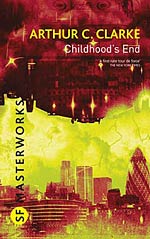
![]() spectru
spectru
4/18/2014
![]()
I was amused at Clarke's reference to the 'giant computing machines' being able to perform in seconds the work of a thousand men with calculators.
There are a couple of things that affect the book's plausibility. The overlords are accepted, seemingly almost from the first. Karellen disliked the term overlord, but it was applied by the people over whom he lorded. It isn't a term of endearment. Americans are fiercely independent. Some Americans are extremely fierce about it. It's hard to buy that most people would accept domination, even benevolent domination, ungrudgingly.
I also can't accept that religion would vanish in less than a lifetime. Faith is blind. Mere facts are not going to convince the faithful to abandon everything they've lived for their entire lives, their sole source of knowledge of right and wrong, their very purpose for existing. Regardless of faith, there are too many people whose power derives from religion. They wouldn't walk away from that. There are cultures in which the collapse of religion would be tantamount to the collapse of civilization. When Karellen finally made his appearance, it just seems so improbable that there was not widespread abhorrence, revulsion, and outright rebellion when the people saw that he looked like the devil himself. Presumably, Clarke included Karellen's description as a demonstration of the utter collapse of religious belief.
The idea of the demise of religion is reiterated near the end of the book. Religion was declining even before the arrival of the overlords - being supplanted by science. Baloney! Religion may have seemed to Clarke to have been in a downturn in the mid-twentieth century, but if so, it was just a cyclical fluctuation. Religion is stronger than ever today, despite scientific advances. Science depends on reason; Religion depends on faith. The two are mutually exclusive.
Good science fiction relies on the suspension of disbelief, but this is just too much. For the sake of the story, I had to take it on faith that faith would have collapsed.
The middle of the book: Rupert's party and the development of the island artist's colony New Athens, seem somewhat superfluous. It wasn't particularly germane to the story. Clarke spent way to much time on these aspects.
The ending is an unexpected twist. Metaphysical, philosophical, as much as science fiction
After all the children became one with the over-mind, their parents, the surviving human race, just gave up - apparently all agreed that life wasn't worth living and committed mass suicide. I don't buy that. It's against human nature.
Bottom line: For me the book is just so-so - not bad, but not great.